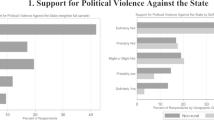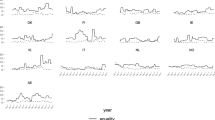Abstract
We study whether and how intergenerational social mobility affects political distrust. Mobile individuals may blame/praise the political system for their movement down/up the social ladder. Accordingly, we theorize how social mobility influences the way people evaluate the political system. We use Dutch survey data and apply diagonal reference models to study effects of intergenerational educational mobility. We find that—controlling for the influence of social positions of origin and destination—downward social mobility results in higher levels of distrust. This suggests that the downwardly mobile perceive their demise from a ‘blame the system’ perspective, while the upwardly mobile perceive their success from a meritocratic perspective. Presumably because upwardly and downwardly mobile individuals rely on a different narrative to frame their experience of mobility, only downward mobility has an impact on attitudes towards politics. As our results demonstrate political consequences of social mobility, they highlight that there is a need to include socialization experiences outside the political domain that take place after early childhood into the theoretical framework to explain political trust.
Similar content being viewed by others
Notes
For theoretical reasons, on which we expand in section “Educational level and political distrust,” we address educational mobility (rather than occupational mobility). Given this focus, we only take intergenerational mobility into account, as intragenerational educational mobility is rare in adult life.
References
Abramson, P., and J. Books. 1971. Social mobility and political attitudes: A study of intergenerational mobility among young British men. Comparative politics 3 (3): 403–428.
Abramson, P. 1983. Political Attitudes in America: Formation and Change. San Francisco, CA: Freeman.
Bourdieu, P. 2000. Pascalian Meditations. Cambridge: Polity Press.
Breen, R. 2001. Social mobility and constitutional and political preferences in Northern Ireland. The British Journal of Sociology 52 (4): 621–645.
Burnham, K., and D. Anderson. 2004. Multimodel inference understanding AIC and BIC in model selection. Sociological Methods & Research 33 (2): 261–304.
Clifford, P., and A. Heath. 1993. The political consequence of social mobility. Sociological Methods & Research 156 (1): 51–61.
Daenekindt, S. 2016. The experience of social mobility. Social isolation, utilitarian individualism, and social disorientation. Social Indicators Research. doi:10.1007/s1120501613693.
De Graaf, N.D., P. Nieuwbeerta, and A. Heath. 1995. Class mobility and political preferences: Individual and contextual effects. American Journal of Sociology 100 (4): 997–1027.
De Graaf, P., M. Kalmijn, G. Kraaykamp, and C. Monden. 2010. The Netherlands longitudinal lifecourse study (NELLS wave 1). Dataset. Netherlands: Tilburg University and Radboud University Nijmegen,
De Graaf, P., and H. Ganzeboom. 1993. Family background and educational attainment in the Netherlands for the 1891-1960 birth cohorts. In Persistent Inequality: Changing Educational Attainment in Thirteen Countries, ed. Y. Shavit, and H.P. Blossfeld, 75–99. Boulder: Westview Press.
De Graaf, P., and H. Ganzeboom. 1990. Intergenerational educational mobility in the Netherlands for birth cohorts from 1891 through 1960. Netherlands’ Journal of Social Sciences 26 (1): 35–50.
Easton, D. 1975. A re-assessment of the concept of political support. British Journal of Political Science 5 (4): 435–457.
Elchardus, M., and J. Siongers. 2015. The often-announced decline of the modern citizen: An empirical, comparative analysis of European young people’s political and civic engagement. In Political Engagement of the Young in Europe: Youth in the Crucible, ed. P. Thijssen, J. Siongers, J. Van Laer, J. Haers, and S. Mels, 133–160. Abingdon: Routledge.
Friedman, S. 2013. The price of the ticket: Rethinking the experience of social mobility. Sociology 48 (2): 352–368.
Friedman, S. 2016. Habitus clivé and the emotional imprint of social mobility. The Sociological Review 64 (1): 129–147.
Galston, W. 2001. Political knowledge, political engagement, and civic education. Annual Review of Political Science 4 (1): 217–234.
Goldthorpe, J. 1980. Social Mobility and Class Structure in Modern Britain, 2nd ed. Oxford: Clarendon Press.
Hakhverdian, A., and Q. Mayne. 2012. Institutional trust, education, and corruption: A micro-macro interactive approach. The Journal of Politics 74 (3): 739–750.
Hardin, R. 1999. Do we want trust in government? In Democracy and Trust, ed. M. Warren, 22–41. Cambridge: Cambridge University Press.
Hargreaves, D. 1967. Social relations in a secondary school. London: Routledge & Kegan Paul.
Harris, J. 1995. Where is the child’s environment? A group socialization theory of development. Psychological Review 102 (3): 458–489.
Hetherington, M. 1998. The political relevance of trust. American Political Science Review 92 (4): 791–808.
Hope, K. 1975. Models of status inconsistency and social mobility effects. American Sociological Review 40 (3): 322–343.
Houle, J.N., and M.A. Martin. 2011. Does intergenerational mobility shape psychological distress? Sorokin revisited. Research in Social Stratification and Mobility 29 (2): 193–203.
Hunt, M. 1996. The individual, society, or both? A comparison of Black, Latino, and White beliefs about the causes of poverty. Social Forces 75 (1): 293–322.
Inglehart, R. 1997. Modernization and Postmodernization: Cultural, Economic and Political Change in 41 Societies. Princeton, NJ: Princeton University Press.
Jennings, K., and R. Niemi. 1968. The transmission of political values from parent to child. American Political Science Review 62 (1): 169–184.
Kingston, P., R. Hubbard, B. Lapp, P. Schroeder, and J. Wilson. 2003. Why education matters. Sociology of Education 76 (1): 53–70.
Kluegel, J., and E. Smith. 1981. Beliefs About Stratification. Annual Review of Sociology 7: 29–56.
Kramer, R. 1999. Trust and Distrust in Organizations: Emerging Perspectives, Enduring Questions. Annual Review of Psychology 50 (1): 569–598.
Lacey, C. 1966. Some Sociological Concomitants of Academic Streaming in a Grammar School. The British Journal of Sociology 17 (3): 245–262.
Lazarsfeld, P.F., Berelson, B. and Gaudet, H. (1972 [1944]). The People’s Choice: How the Voter Makes up his Mind in a Presidential Campaign. New York: Columbia University Press.
Levi, M., and L. Stoker. 2000. Political trust and trustworthiness. Annual Review of Political Science 3: 475–507.
Lipset, S.M., and R. Bendix. 1959. Social Mobility in Industrial Society. Berkeley and Los Angeles: University of California Press.
Lopreato, J. 1967. Upward social mobility and political orientation. American Sociological Review 32 (4): 586–592.
Lopreato, J., and J. Chafetz. 1970. The political orientation of skidders: A middle-range theory. American Sociological Review 35 (3): 440–451.
Merton, R. 1968. Social Theory and Social Structure. New York: Free Press.
Meyer, J. 1977. The effects of education as an institution. American Journal of Sociology 83: 55–77.
Mishler, W., and R. Rose. 2001. What are the origins of political trust? Testing institutional and cultural theories in post-communist societies. Comparative Political Studies 34 (1): 30–62.
Missinne, S., S. Daenekindt, and P. Bracke. 2015. The social gradient in preventive healthcare use: What can we learn from socially mobile individuals? Sociology of Health & Illness 37 (6): 823–838.
Monden, C.W.S., and N.D. De Graaf. 2013. The importance of father’s and own education for self-assessed health across Europe: an east–west divide? Sociology of Health & Illness 35 (7): 977–992.
Newman, K. 1989. Falling From Grace: The Experience of Downward Mobility in The American Middle Class. New York: Vintage Books.
Newton, K. 2009. Social and political trust. In The Oxford Handbook of Political Behavior, ed. R.J. Dalton, and H.-D. Klingemann, 342–361. Oxford: Oxford University Press.
Niemi, R., and B. Sobieszek. 1977. Political socialization. Annual Review of Sociology 3: 209–233.
Nieuwbeerta, P., N.D. De Graaf, and W. Ultee. 2000. The effects of class mobility on class voting in post-war Western industrialized countries. European Sociological Review 16 (4): 327–348.
Nye, J., P. Zelikow, and D. King. 1997. Why people don’t trust government. Harvard: Harvard University Press.
Putnam, R., R. Leonardi, and R. Nanetti. 1993. Making democracy work. Princeton: Princeton University Press.
Putnam, R. 2000. Bowling Alone. The collapse and Revival of American Community. New York: Simon & Schuster.
Sapiro, V. 2004. Not your parents’ political socialization: introduction for a new generation. Annual Review of Political Science 7: 1–23.
Schoon, I., and H. Cheng. 2011. Determinants of political trust: A lifetime learning model. Developmental Psychology 47 (3): 619–631.
Sharone, O. 2013. Why do unemployed Americans blame themselves while Israelis blame the system? Social Forces 91 (4): 1429–1450.
Sobel, M. 1981. Diagonal mobility models—a substantively motivated class of designs for the analysis of mobility effects. American Sociological Review 46 (6): 893–906.
Sobel, M. 1985. Social mobility and fertility revisited: some new models for the analysis of the mobility effects hypothesis. American Sociological Review 50 (5): 699–712.
Sorokin, P. 1927. Social Mobility. New York: Harper and Brothers.
Sorokin, P. 1959. Social and Cultural Mobility. London: Free Press.
Spruyt, B., F. Van Droogenbroeck, and D. Kavadias. 2015. Educational tracking and sense of futility: a matter of stigma consciousness? Oxford Review of Education 41 (6): 747–765.
Spruyt, B. 2015. Talent, effort or social background? an empirical assessment of popular explanations for educational outcomes. European Societies 17 (1): 94–114.
Spruyt, B., and T. Kuppens. 2015. Education-based thinking and acting? Towards an identity perspective for studying education differentials in public opinion and political participation. European Journal of Cultural and Political Sociology 2 (3–4): 291–312.
Stoker, L., and J. Bass. 2011. Political socialization: Ongoing questions and new directions. In The Oxford Handbook of American Public Opinion and the Media, ed. G. Edwards III, L. Jacobs, and R. Shapiro, 453–470. Oxford: Oxford University Press.
Swidler, A. 1986. Culture in action: symbols and strategies. American Sociological Review 51 (2): 273–286.
Ten Kate, J., W. De Koster, and J. Van der Waal. 2017. Why are depressive symptoms more prevalent among the less educated? The relevance of low cultural capital and cultural entitlement. Sociological Spectrum 37 (2): 63–76.
Tonge, J., A. Mycock, and B. Jeffery. 2012. Does citizenship education make young people better-engaged citizens? Political Studies 60 (3): 578–602.
Tumin, M. 1957. Some unapplauded consequences of social mobility in a mass society. Social Forces 36: 32–37.
Uslaner, E. 2002. The moral foundations of trust. Cambridge: Cambridge University Press.
Van de Werfhorst, H., and J. Mijs. 2010. Achievement inequality and the institutional structure of educational systems: A comparative perspective. Annual Review of Sociology 36: 407–428.
Van de Werfhorst, H. 2015. Een Kloof van Alle Tijden. Amsterdam: Amsterdam University Press.
Van der Meer, T. 2010. In what we trust? A multi-level study into trust in parliament as an evaluation of state characteristics. International Review of Administrative sciences 76 (3): 517–536.
Van Houtte, M. 2006. School type and academic culture: Evidence for the differentiation–polarization theory. Journal of Curriculum Studies 38 (3): 273–292.
Van Meeteren, M., P. Mascini, and D. Van den Berg. 2015. Trajectories of economic integration of amnestied immigrants in Rotterdam. Journal of Ethnic and Migration Studies 41 (3): 448–469.
Van der Waal, J., W. De Koster, and J. Van Noord. 2017. Opleidingsverschillen in maatschappelijk onbehagen en wantrouwen in de politiek in Nederland, 1970–2012. In Middenklasse(n) onder druk? ed. G. Engbersen, M. Kremer, and E. Schrijvers. Den Haag: WRR.
Weakliem, D. 1992. Does social mobility affect political behaviour? European Sociological Review 8 (2): 153–165.
Weakliem, D. 1999. A critique of the Bayesian information criterion for model selection. Sociological Methods & Research 27 (3): 359–397.
Wickham, H. 2009. ggplot2: Elegant Graphics for Data Analysis. New York: Springer-Verlag.
Zuckerman, M. 1979. Attribution of success and failure revisited, or: The motivational bias is alive and well in attribution theory. Journal of Personality 47 (2): 245–287.
Acknowledgements
We thank Eefje Steenvoorden and the anonymous Acta Politica reviewers for their kind and helpful comments on an earlier version of this manuscript.
Author information
Authors and Affiliations
Corresponding author
Rights and permissions
About this article
Cite this article
Daenekindt, S., van der Waal, J. & de Koster, W. Social mobility and political distrust: cults of gratitude and resentment?. Acta Polit 53, 269–282 (2018). https://doi.org/10.1057/s41269-017-0050-4
Published:
Issue Date:
DOI: https://doi.org/10.1057/s41269-017-0050-4




